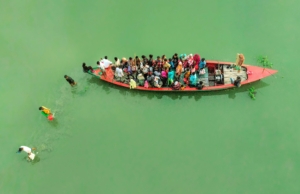Friendship: Support To Remote Communities in Bangladesh
 Bangladesh is situated in South Asia on the Bay of Bengal. It is the eighth most densely populated country in the world, with a population of more than 175 million in an area of 148,460 sq km. It is a country of striking contrasts: rich in culture and resilience, yet acutely vulnerable to the impacts of changing climatic conditions. Most of the country is situated only nine meters above sea level.
Bangladesh is situated in South Asia on the Bay of Bengal. It is the eighth most densely populated country in the world, with a population of more than 175 million in an area of 148,460 sq km. It is a country of striking contrasts: rich in culture and resilience, yet acutely vulnerable to the impacts of changing climatic conditions. Most of the country is situated only nine meters above sea level.
An estimated 3.5 million people in the low-lying delta region face increasing threats from rising sea levels and more intense monsoon seasons. Indeed, in 2022 alone, historic floods devastated northern regions like Sylhet and Sunamganj, displacing millions and severely disrupting transportation, electricity, health care and access to education.
Despite the risks, many of Bangladesh’s neediest communities live in low-lying coastal and riverine areas, lacking sufficient income to live in lower-risk regions. These zones are fertile and agriculturally productive. However, when floods occur, it is children and low-income families who suffer most, facing destroyed homes, lost livelihoods and health crises with little support.
From One Floating Hospital to a National Lifeline
In 2002, Runa Khan founded Friendship, a nongovernmental organization (NGO) with a radical yet simple mission: delivering support to remote communities in Bangladesh with reduced access. The initiative launched a floating hospital on the Jamuna River in northern Bangladesh. This aims to provide essential health services to isolated communities living on “chars”― sandbar islands that vanish and reappear with the tides.
Since then, Friendship has evolved into a wide-reaching, holistic organization. Today, its 5,000 employees ― more than 70% of whom come from local communities ― work to break cycles of poverty and increase resilience to the regional climate crisis. Its integrated approach includes health care, education, disaster preparedness, economic development and clean energy and water access.
Health Care and Remote Communities in Bangladesh
Friendship operates a unique three-tier health care system:
- Tier 1: Two floating hospitals and two land hospitals bring lifesaving services to remote areas. The Shyamnagar hospital alone provided emergency services to 317 patients in recent years.
- Tier 2: Two cervical cancer screening centers tackle Bangladesh’s second-most prevalent form of cancer, offering prevention and treatment in areas where such services are rarely available.
- Tier 3: About 680 Friendship Community Medic-Aides, local women trained in basic medical care, offer antenatal, postnatal and child health services.
Powering Livelihoods and Clean Futures
Friendship’s Sustainable Economic Development program supports long-term resilience. In its innovative solar villages, 291 households, 62 shops, four schools and two mosques are now powered by 24-hour solar energy. This has enabled families to extend working hours, refrigerate food and medicines and improve safety and security at night. Clean water access is another priority. Friendship has also supplied more than 700,000 liters of clean drinking water to hundreds of families, drastically reducing disease.
Meanwhile, the organization’s farmers’ club provides sustainable farming training. It empowers more than 1,400 farmers to grow climate-resilient crops like sweet potatoes and mustard. Romesa Khatun, a club member, began using earthworms to make fertilizer in 2022, selling the product and using it in her vegetable garden. She says that the support of the club and Sherazul Islam, project officer at Friendship’s Sustainable Economic Development Sector, empowered her to embrace innovative farming techniques to support her family, especially when her husband is away for work.
These programs boost food security and provide more adaptive livelihoods to environmental challenges.
Hope from Within
In Bangladesh’s flood-prone coastal and riverine communities, poverty and climate vulnerability often go hand in hand. But through Friendship’s work with remote communities in Bangladesh, hope is taking root. What began as a floating hospital has become a nationwide lifeline. It delivers support to remote communities and uplifts them with health care, education, economic opportunity and climate resilience.
Rather than relying on top-down aid, Friendship invests in people ― training local women as community health workers, equipping youth with education and leadership skills and helping farmers adapt to a changing climate. Indeed, Friendship’s impact shows that locally led, community-focused development can help vulnerable populations chart a path toward safety, dignity and lasting change even in the face of rising waters.
– Holly McArthur
Holly is based in Somerset, UK and focuses on Good News and Global Health for The Borgen Project.
Photo: Pexels
